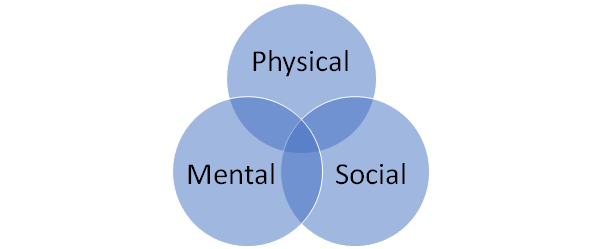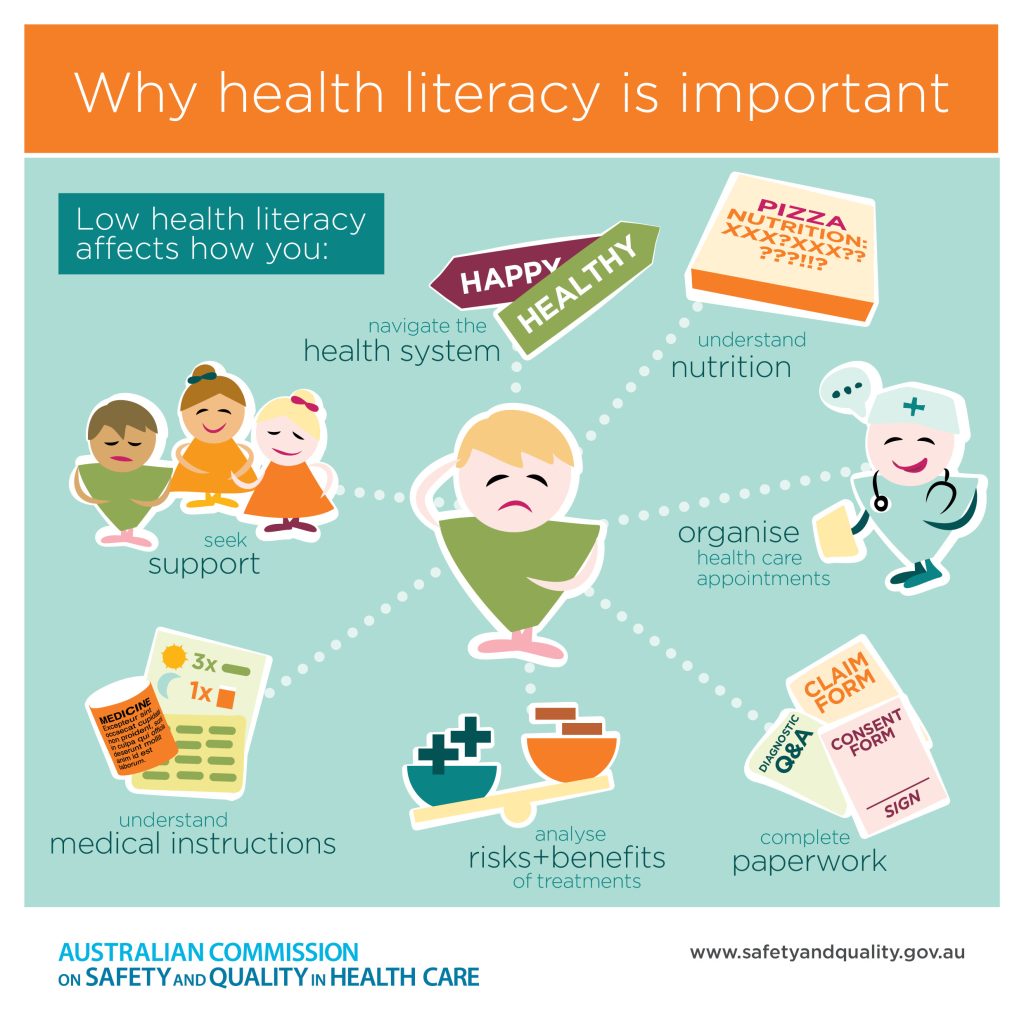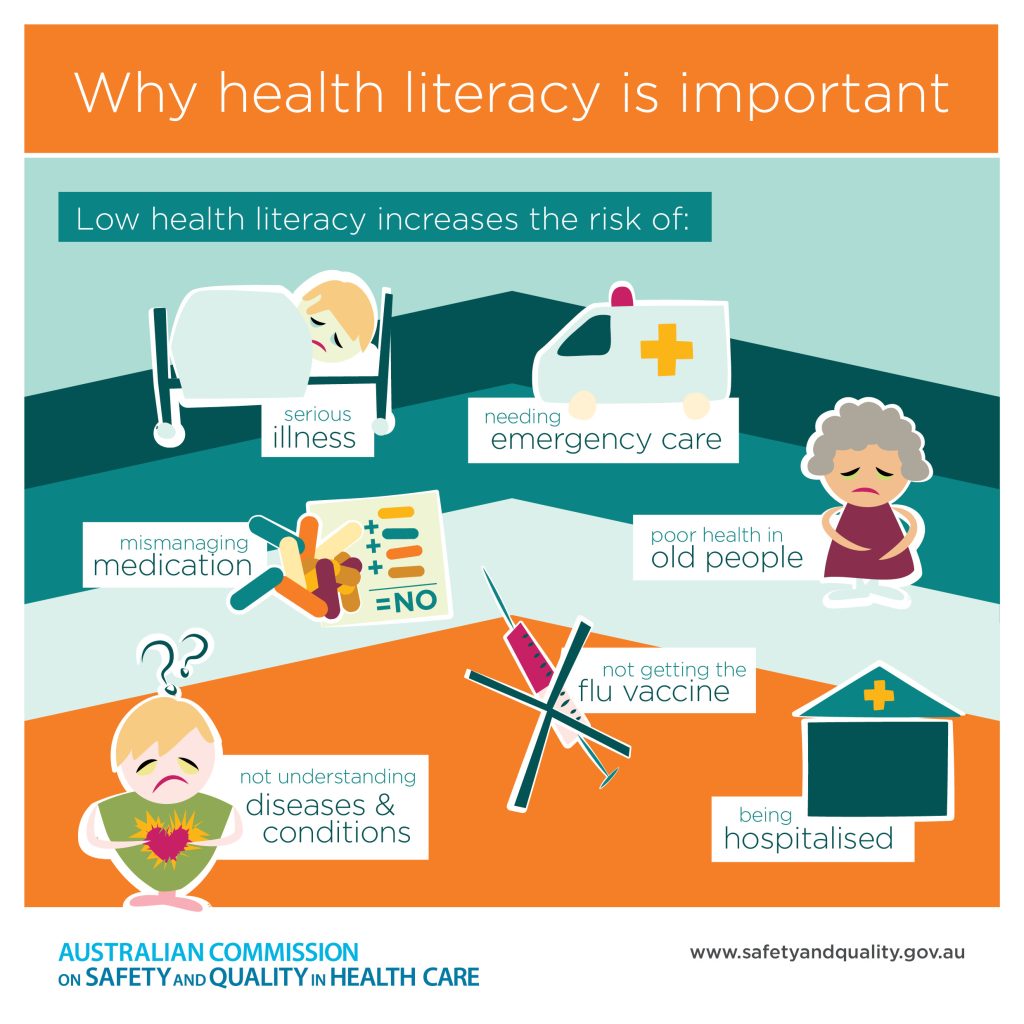1 Introduction to health
- What is health?
- What is health literacy?
- Importance of health literacy
- Improving health literacy
- Personal health information
What is health?
Health is a state of complete physical, mental and social well-being and not merely the absence of disease or infirmity.
Source: Preamble to the constitution of the World Health Organization (WHO).

Health is a multifaceted concept. It is not simply the condition of being well or unwell. Health can be a personal perspective which is affected by society and social conditions. Health is affected by:
- genetic factors
- lifestyle factors
- environmental factors
- culture
- socioeconomic conditions
- health care services and programs
Health can also be seen from several models or perspectives:
- biomedical/medical
- social
- biopsychosocial.
Health is a state of wellbeing. It reflects the complex interactions of a person’s genetics, lifestyle and environment. Generally, a person’s health depends on two things: determinants (factors that influence health) and interventions (actions taken to improve health, and the resources required for these interventions).
Source: Australian Institute of Health and Welfare (AIHW) Australia’s health 2018 (PDF, 349KB).
Health can mean:
- feeling well
- fitness
- a balanced life
- connection and purpose
- not being sick
- quality of life.
When researching health, your question may encompass multiple concepts, such as fitness, technology and disease. The following resources provide aspects to consider:
What is health literacy?
Health literacy refers to how people understand information about health and health care, and how they apply that information to their lives, use it to make decisions and act on it.
Source: Australian Commission on Safety and Quality Health Care.
Health literacy has two key parts.
- Individual health literacy is concerned with people’s ability to access, understand, appraise and apply health information to make decisions and take action.
- Health literacy environment is concerned with the make-up of the healthcare systems and services and how this affects individuals.
About health literacy
What is health literacy? (YouTube, 3m8s) by the New South Wales Mental Health Commission. Health professionals explain what health literacy means.
Importance of health literacy
Health literacy is important because it helps:
- consumers make informed decisions and take action for their health
- clinicians communicate with consumers, organisations and policymakers about health and to deliver care
- organisations and policymakers to provide systems and services that consumers and clinicians can navigate.
The COVID-19 pandemic is an example of how communities had to understand and act on health information provided by clinicians and organisations to slow the spread of the disease.
Effects of low health literacy

Creative Commons Attribution-Non-Commercial-ShareAlike 4.0 International License.
Risks from low health literacy

Creative Commons Attribution-Non-Commercial-ShareAlike 4.0 International License.
Good health and wellbeing is included in the UN Sustainable Development Goals. Health literacy is considered one of the key health promotion pillars for achieving the Sustainable Development Goal (SDG) targets. It advocates for higher levels of health literacy, which can result in the reduction of health inequities and improved social benefits for populations, including:
- reduced poverty
- more access to education
- better work environments
- economic growth.
Improving health literacy
It is not just the responsibility of individuals to improve their health literacy. Governments, organisations and health providers must ensure that they provide health information and systems that all can understand and navigate.
There are still many Australians who lack the level of literacy necessary to understand and apply health information. Most government information on COVID-19 is too hard for the average Australian to understand. Many are written in a way that requires a high level of reading comprehension.
Of those who participated in the National Health Survey: Health literacy, 2018, conducted by the Australian Bureau of Statistics (ABS):
- 17% felt that they are not able to appraise health information (e.g. able to identify reliable sources of information)
- 12% find it difficult to find good health information (e.g. using a range of sources to find up to date information)
- 8% find it difficult to understand health information well enough to know what to do (e.g. being able to understand all written health information and able to write appropriately on forms).
Other significant results from the survey were that young people and those who do not speak English at home experienced more difficulty than other groups.
- Nearly 1 in 5 (19%) people aged 18–24 find navigating the health care system difficult. This fell to 7.9% for those aged 65 and over
- Those who do not speak English in the home were less likely to feel understood and supported by health care providers.
The World Health Organization (WHO) describes ways to increase health literacy.
- Governments develop policies and plans to provide accurate, up to date, unbiased information
- Society and community leaders work together to bring expertise and experiences to their different communities and provide risk communication
- Media and social media provide platforms to support ethical and accurate health literacy messaging
- Researchers and academic institutions provide methods and examples of health literacy best practice and evidence for what interventions work.
The Australian Commission on Safety and Quality Health Care recommends these methods to improve health literacy:
- embed health literacy into high-level systems and organisational policies and practices
- ensure that health information is clear, focused and useable, and that interpersonal communication is effective
- integrate health literacy into education for consumers and healthcare providers.
The National Safety and Quality Health Service (NSQHS) has a Partnering with Consumers Standard to ensure consumers have a voice in planning systems and services and in their own care.
- Centre for Culture, Ethnicity and Health provides resources for health professionals and consumers to support health literacy
- Smart health choices: Making sense of health advice is a book aimed at helping consumers and practitioners make better informed choices about health.
Personal health information
Health information is any personal information about your health or disability. It includes information or opinion about your illness, injury or disability.
Your personal health information includes any information generated when you receive health services or plan for your health future.
My Health Record
My Health Record is an Australian online personal health record system which has been in place since 2012. The purpose of the My Health Record is to provide a patient controlled online summary of health information. The My Health Record can be used to record medical records, medicine, referral documents, medical imaging reports, advanced care planning information, contact numbers and health notes. Personal health record tools like My Health Record work best for those with a good level of health literacy, as well as digital and data literacy.
About My Health Record
Digital inclusion, health literacy and My Health Record webinar, 13 September 2018 (YouTube, 1h4m) discusses what skills are required to use My Health Record and some ethical concerns.

